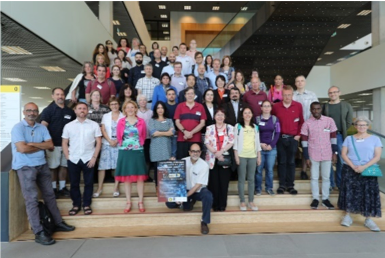-
A New Initiative: The European Astrobiology Institute
October 29, 2018 / Written by: Wolf Geppert
Source: http://europeanastrobiology.eu/Astrobiology has a long tradition in Europe, which manifested itself in the foundation of the Centro de Astrobiologia in 1999 (CAB) and the launch of the European Astrobiology Network Association (EANA) in 2001. CAB has organized, in collaboration with the NASA Astrobiology Institute (NAI), sixteen “International Summer Schools in Astrobiology,” and EANA holds annual workshops in the field attended by astrobiologists from all over the world. Since this date, many national astrobiology societies and a regional astrobiology network (the Nordic Network of Astrobiology, which has organised a multitude of astrobiology events) in Europe, have been created. Despite recommendations of the recent EU-funded AstroMap report, a Europe-wide network of institutions in astrobiology does not yet exist, in contrast to the situation in the US (where NAI is celebrating its 20th anniversary this year).
Nevertheless, two pan-European initiatives have been launched during the last couple of years:
• The European Union-funded COST-Action entitled “Origins and Evolution of Life on Earth and in the Universe” (2014-2018)
• The Erasmus+ Strategic Partnership “European Astrobiology Campus” (2014-2017)These initiatives offered funding for a multitude of scientific meetings, summer schools, and scientific missions. Their ambitious programme furthermore included a workshop on outreach and an International Astronomical Union (IAU) symposium on education in astronomy and astrobiology. Last but not least, a new edition of the Encyclopaedia of Astrobiology has been issued. Following these activities, the “European Astrobiology Campus” was highlighted as a “Success story” by the European Union.

Meteorite impact crater dating project by Early Career Scientists during a summer school of the European Astrobiology Campus. Source: W. GeppertTo keep the momentum of these initiatives, a consortium of scientists affiliated with the key players in astrobiology in Europe decided to launch a European Astrobiology Institute. It will be a virtual entity consisting of research organisations and higher education institutions and its tasks will be to:
• Perform ground-breaking research on key scientific questions in astrobiology
• Effectively disseminate high-quality results of these efforts
• Provide interdisciplinary training for students and early career scientists
• Engage in education on astrobiology on all levels
• Liaise with industry to foster collaboration on technological developments relevant to astrobiological research
• Coordinate outreach activities of European astrobiologists to the general public, industry, and all other relevant stakeholders
• Act as advisory body for and provide high-quality expertise to European research organisations and decision makers
• Ensure the necessary financial means through a coordinated approach to European funding agenciesAn Interim Board has been established and the first General Assembly of the EAI is planned for 28-30 May 2019. Further information about the EAI is available at the preliminary website of the institute:
To discuss all matters regarding the institute, a forum has been installed. All astrobiologists are welcome to join. Instructions on how to participate can be found at the above-mentioned website.

Training the Trainers: IAU Symposium on Education in Astronomy and Astrobiology. Source: W. GeppertSource: [European Astrobiology Institute]
- The NASA Astrobiology Institute Concludes Its 20-year Tenure
- Global Geomorphologic Map of Titan
- Molecular Cousins Discovered on Titan
- Interdisciplinary Consortia for Astrobiology Research (ICAR)
- The NASA Astrobiology Science Forum Talks Now on YouTube
- The NASA Astrobiology Science Forum: The Origin, Evolution, Distribution and Future of Astrobiology
- Alternative Earths
- Drilling for Rock-Powered Life
- Imagining a Living Universe
- Workshops Without Walls: Astrovirology